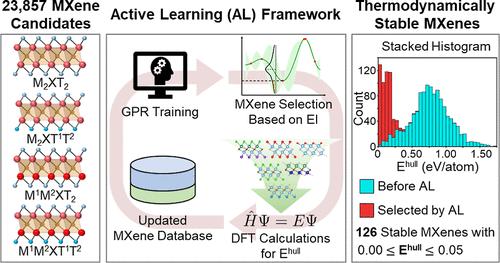在广阔的化学空间加速寻找热力学稳定的二甲苯的主动学习框架
IF 16
1区 材料科学
Q1 CHEMISTRY, MULTIDISCIPLINARY
引用次数: 0
摘要
由于其组成和化学计量的多样性,二氧化三烯具有广泛的材料特性,从而促进了它们在电极、催化剂和超级电容器等各种技术应用中的利用。要探索它们的适用性,首先要确定热力学上稳定且可合成的 MXenes。利用密度泛函理论(DFT)计算的凸壳上方能量(Ehull)是探究热力学稳定性的一个有力指标。然而,DFT 的计算成本较高,限制了未知化学的搜索空间。为了应对这一挑战,本研究提出了一种由代理模型和实用函数组成的主动学习(AL)框架,以便在由 23,857 个具有组成和化学计量多样性的 MXenes 组成的广阔化学空间中快速识别热力学稳定的 MXenes。利用 AL 框架的快速推断速度和准确鉴定稳定 MXenes 的能力,只需要 480 次 DFT 计算就能鉴定出 126 个热力学稳定的 MXenes;其中 89 个 MXenes 的稳定性以前从未报道过。与此相反,在随机选择的 1693 个 MXenes 中,仅发现了两个稳定的 MXenes,这表明仅使用 DFT 计算探索大型化学空间的效率很低。AL 框架成功地减少了 DFT 计算的次数,同时最大限度地提高了所发现的热力学稳定的 MXenes 的数量,有助于今后快速找到稳定的 MXenes 的研究。本文章由计算机程序翻译,如有差异,请以英文原文为准。

Active Learning Framework for Expediting the Search of Thermodynamically Stable MXenes in the Extensive Chemical Space
MXenes possess a wide range of materials properties owing to their compositional and stoichiometric diversities, facilitating their utilization in various technological applications such as electrodes, catalysts, and supercapacitors. To explore their applicability, identification of thermodynamically stable and synthesizable MXenes should precede. The energy above the convex hull (Ehull) calculated using the density functional theory (DFT) is a powerful scale to probe the thermodynamic stability. However, the high calculation cost of DFT limits the search space of unknown chemistry. To address this challenge, this study proposes an active learning (AL) framework consisting of a surrogate model and utility function for expeditious identification of thermodynamically stable MXenes in the extensive chemical space of 23,857 MXenes with compositional and stoichiometric diversity. Exploiting the fast inference speed and the capability of the AL framework to accurately identify stable MXenes, only 480 DFT calculations were required to identify 126 thermodynamically stable MXenes; among these, the stabilities of 89 MXenes have not been previously reported. In contrast, only two stable MXenes were identified among randomly selected 1693 MXenes, demonstrating the inefficiency of using only DFT calculations in exploring a large chemical space. The AL framework successfully minimized the number of DFT calculations while maximizing that of thermodynamically stable MXenes identified and can contribute to future studies in finding stable MXenes expeditiously.
求助全文
通过发布文献求助,成功后即可免费获取论文全文。
去求助
来源期刊

ACS Nano
工程技术-材料科学:综合
CiteScore
26.00
自引率
4.10%
发文量
1627
审稿时长
1.7 months
期刊介绍:
ACS Nano, published monthly, serves as an international forum for comprehensive articles on nanoscience and nanotechnology research at the intersections of chemistry, biology, materials science, physics, and engineering. The journal fosters communication among scientists in these communities, facilitating collaboration, new research opportunities, and advancements through discoveries. ACS Nano covers synthesis, assembly, characterization, theory, and simulation of nanostructures, nanobiotechnology, nanofabrication, methods and tools for nanoscience and nanotechnology, and self- and directed-assembly. Alongside original research articles, it offers thorough reviews, perspectives on cutting-edge research, and discussions envisioning the future of nanoscience and nanotechnology.
 求助内容:
求助内容: 应助结果提醒方式:
应助结果提醒方式:


